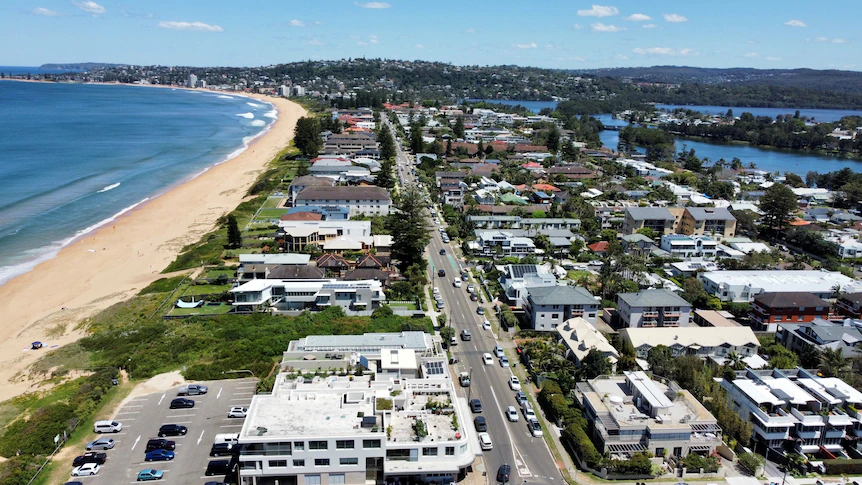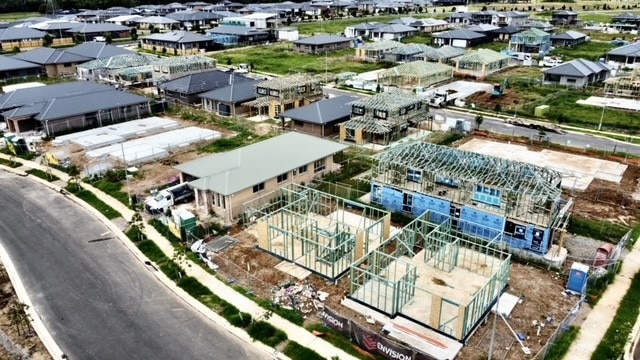How long after missing a mortgage payment does a home get repossessed? A financial counsellor says it doesn't have to come to that
With the Reserve Bank of Australia warning of more interest rate rises in the future, there are fears overextended borrowers might default on their mortgage repayments.
It's a frightening prospect but Lody Stewart, a financial counsellor who works with Financial Counselling Australia, says there are ways to get yourself out of trouble.
But before we get into that, let's run through the three steps of a bank repossessing a home.
What's the process of the bank repossessing your house?
There are three basic steps to the process of a bank reprocessing a home due to missed mortgage repayments.
Here's how Money Smart, a federal government website set up to help Australians grappling with money problems, explains it:
1) Default notice
First, the bank has to issue a default notice.
This notice gives you 30 days to make the payments you've missed as well as your ongoing repayments.
2) Statement of Claim
If those 30 days go by and you haven't made the repayments, your bank can send what's called a Statement of Claim or a summons.
This marks the beginning of the bank's legal action against you to claim the remaining amount on your home loan back.
You can file a defence or lodge a dispute with a dispute resolution scheme at this point — but how much time you have to do so depends on which state or territory you're in.
If you do nothing, the bank can repossess your home.
3) Eviction
If the bank gets a court order to repossess your home, you'll be sent a Notice to Vacate or a Sheriff's letter.
Then a sheriff will come to your home, evict you and change the locks.
But having trouble making your mortgage payments doesn't have to end in eviction.
Here's how to navigate the situation.
What can you do if you know you're going to miss a repayment?
Ms Stewart says you should call a financial counsellor for free by calling the National Debt Helpline on 1800 007 007.
She says you need to work out how much you can pay.
"Review your income and expenses and prepare a budget, as this will allow you to know how much you can realistically afford to allocate to your repayments".
"Look at ways of reducing other expenses / outgoings to free up money to pay your home loan".
And make sure you call your bank.
"If you have missed a payment, you can't make the repayment in full, or you think you might miss a payment, it is vital you call your lender – without delay – to ask for hardship assistance and discuss your options," Ms Stewart said.
"The earlier you work out those options, the better the outcome will be."
How long do banks wait to send a default notice?
"There are no hard and fast rules," Ms Stewart said.
Banks will generally wait until a customer is at least 60 days behind, she said.
And a default won't be listed on your credit report until at least 60 days.
Rising interest rates hit home prices again, stretching buyers to the limit

Home prices have been dropping over the past six months as the Reserve Bank of Australia has raised interest rates from a record low in May to curb red-hot inflation.
Read more...
What should I do if I get a default notice?
Work out when it's due to expire.
At this point, it's still possible to stop things going any further.
"The default notice must give the consumer at least 30 days to fix the default," Ms Stewart said.
"Enforcement proceedings can begin only if the default notice period has expired, and the consumer has not fixed the default."
You can talk through your situation with a financial counsellor by calling the National Debt Helpline at 1800 007 007.
What are your options if you get a default notice?
Here's a few of your options:
- Work out a hardship assistance arrangement with your bank
- Find way to make the current repayments — this might mean asking for a pay rise at work, taking on an extra job or renting out a room for extra income
- Move out, rent your entire home and live somewhere that costs less than your mortgage repayments
- Sell your home
- Let the bank repossess your house
How do I get hardship assistance?
What hardship assistance you get will depend on your circumstances, but your bank might agree to temporarily reduce or pause your payments until you can return to your normal repayments.
To organise this, you'll need to contact your bank.
"Ask to speak with the hardship department and explain that you are in financial hardship," Ms Stewart said.
"The hardship department staff will explain your options and offer a hardship variation."
Ms Stewart says you should ask about the following options, if they suit you:
- pay reduced amount for a few months until your circumstances improve
- have the term of the mortgage extended to add three months of overdue payments and interest to the end of the loan
- stop paying your mortgage temporarily until things improve
- pay the interest only for the time being
- be offered a changed payment plan
"But do not agree to a repayment plan you know you cannot afford," Ms Stewart said.
"If you break the repayment arrangement, this can make it harder to negotiate another payment plan in the future."
And make sure to keep records of who you spoke to and when.
What if I can't get a hardship assistance?
"If you can't come to an agreement with your lender, and the default notice is about to expire, or has expired, then lodge a dispute with the Australian Financial Complaints Authority (AFCA) immediately," Ms Stewart said.
"Your lender cannot continue any further enforcement proceedings while the matter is with AFCA and still unresolved.
"During this time, keep making the repayments you can afford – this will stop you from getting any further behind and help demonstrate to AFCA and the lender that the amount you are proposing is affordable."

Have a chat with your bank about their financial hardship arrangements, but make sure you don't agree to a payment plan you know you can't afford. (ABC South East SA: Kate Hill)
What if the bank sells the house for less than what you owe?
You'll still have to pay back the full amount of the loan.
What if bank sells your house for more than what you owe?
You keep what's left over.
But you might need that leftover cash to pay extra legal fees and outstanding costs like council rates or body corporate fees you'll have to settle.
Biggest cost of living increases

Millions of Australians struggling under soaring inflation are about to face another increase in the fastest-rising cost of living.
Read more...
Can the bank make you sell your other assets?
No.
It can only make you sell what's attached to the loan, Ms Stewart said.
"The exception is if this matter ends in a bankruptcy process," she said.
If your home is repossessed, does that mean you're bankrupt?
No.
"You are only bankrupt if you have declared bankruptcy or been made involuntarily bankrupt by a creditor," Ms Stewart said.
"Your mortgage lender does not have to make you bankrupt to repossess your home.
"Bankruptcy will obviously affect your credit rating and, therefore, the ability to obtain credit in the future."
This article was written by Dannielle Maguire of ABC News Australia 🔗
